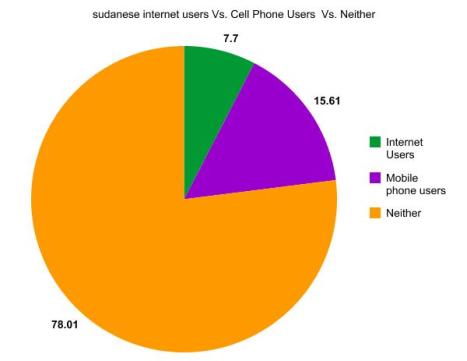Sudanese Internet Users Vs. Mobile Phone Users

This graph shows that there are considerably more mobile phone users in Sudan than internet users. Recently, Google has developed a set of mobile phone services for mobile phones in Uganda. The services would be ideal for Sudanese Internet users also. A study conducted by the OpenNet initiative has found that:
Internet usage in Sudan is limited. Where infrastructure does exist, access can be prohibitively expensive. There are few locally produced Web pages.
The infrastructure in Sudan is not optimized for high-speed data communications services, and both the capability and reliability of domestic data networks need improvement. Fifteen Internet service providers (ISPs) operate in Sudan (2006), but only two have direct connectivity to the global Internet; the rest are considered by the Sudanese government to be operating illegally.
The number of home Internet subscriptions increased by a factor of ten between 2001 and 2005, rising from 50,000 to 500,000. During the same period, the number of Internet cafés more than doubled. However, Internet usage remains concentrated in Khartoum, accounting for 95 percent of Internet users. The majority of Internet users in Sudan rely on dialup connections (59 percent), and very few have high-speed Internet (19 percent). While 81 percent of universities in Sudan are Internet-equipped, most (65 percent) still use dialup connections.
The information and telecommunications sector in Sudan is regulated by the National Telecommunication Corporation (NTC). In 1993, the state-owned Public Telecommunication Corporation was transformed into the Sudan Telecommunication Company (Sudatel), allowing private investors to purchase a share in the enterprise. However, two-thirds of the shares of the company remained in government hands while it assumed exclusive operational control of the sector.
In 2001, the Sudanese government adopted the National Strategy for Building the Information Industry, with the goal of enabling “all sectors of society to access information media in a way leading to the widest dissemination and utilization of information, all of which shall contribute to achieve an appreciated economic growth, wealth development, job opportunities, enhancement of all-sector production rates and eradication of poverty. As a result of the Strategy, Sudatel’s monopoly over mobile telephony ended in 2002 and competitive operators—including several ISPs—in telecommunications were licensed.
1 Comment »
-
Archives
-
Categories
-
RSS
Entries RSS
Comments RSS



[…] Sudanese Internet Users Vs. Mobile Phone Users « The Sudanese FutureThe information and telecommunications sector in Sudan is regulated by the National Telecommunication Corporation (NTC). In 1993, the state-owned Public Telecommunication Corporation was transformed into the Sudan Telecommunication … […]
Pingback by Telecommunications » How the SF Giants saved a million bucks with telecommunications ... | July 10, 2009 |